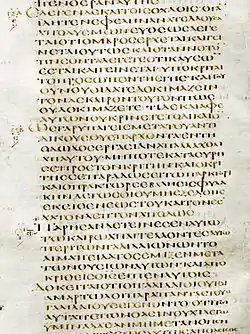
The Byzantine priority theory, also called the Majority Text theory, is a theory within textual criticism held by a minority of textual critics. This view sees the Byzantine text-type as the most accurate textual tradition, instead of the Alexandrian text-type or the Western text-type.[1][2][3] Known advocates of this view include: Maurice Robinson, Zane Hodges and John Burgon.[4][5] The Majority Text theory must be distinguished from the view of those who advocate the Textus Receptus, as although the Byzantine text is very similar to the Textus Receptus, it contains some minority readings which Byzantine priorists reject.[6]
History
The Majority Text movement began very soon after B. F. Wescott's and F. J. A Hort's The New Testament in the Original Greek was published, starting as a response to the views of Wescott and Hort. The chief of the early advocates of this view was John Burgon.[7] The Byzantine priority theory has been advocated more recently by modern textual critics such as Zane Hodges, William G. Pierpont, Arthur Farstad and Maurice Robinson, however it remains a minority position among textual critics.[4][8][1][9]
Theory
Advocates of the Byzantine priority theory often assume that the majority of the manuscripts are more likely to preserve the original readings.[1] According to Maurice Robinson, the Byzantine priority theory is primarily a transmissionally-based theory, and internal evidences are only to be applied after an evaluation of the external data has been made. Although Byzantine priorists place more weight on the most common readings found, its advocates do not entirely focus on the raw number of manuscripts, instead the value of manuscripts are still valued by factors such as the age of the manuscript and the particular scribal habbits of the copyists.[10]
Some advocates of the theory such as John Burgon have attempted to demonstrate that the Byzantine text is the most ancient form of the New Testament text by placing emphasis on patristic quotations of the New Testament, which he claimed to agree generally with the Byzantine text. However his conclusions and assumptions are highly controversial and have been subject to criticism.[11]
Criticism
The Majority Text theory has been criticized by major textual critics such as Bart D. Ehrman and Daniel B. Wallace.[7] According to Ehrman, its advocates often have theological presuppositions which lead them to argue for a specific preserved text-type and the Byzantine text did not become the majority of the manuscripts until the 9th century.[12]
References
- 1 2 3 Quarles, Charles L.; Kellum, L. Scott (2023-06-20). 40 Questions About the Text and Canon of the New Testament. Kregel Publications. ISBN 978-0-8254-7590-0.
- ↑ Pierpont, William G.; Robinson, Maurice A. (2019-12-17). The Case for the Byzantine Priority. Amazon Digital Services LLC - KDP Print US. ISBN 978-1-6764-0916-8.
- ↑ White, James R. (June 2009). The King James Only Controversy: Can You Trust Modern Translations?. Baker Books. ISBN 978-0-7642-0605-4.
- 1 2 Hodges, Zane (1961). "The ecclesiastical text of Revelation: does it exist?". Bibliotheca Sacra.
- ↑ Heuer, Mark (1995). "AN EVALUATION OF JOHN W. BURGON'S USE OF PATRISTIC EVIDENCE" (PDF). The Evangelical Theological Society.
- ↑ "The Majority Text and the Original Text: Are They Identical? | Bible.org". bible.org. Retrieved 2023-12-24.
- 1 2 WALLACE, DANIEL (1994). "THE MAJORITY!TEXT THEORY: HISTORY, METHODS AND CRITIQUE" (PDF). JETS.
- ↑ Knust, Jennifer; Wasserman, Tommy (2020-01-14). To Cast the First Stone: The Transmission of a Gospel Story. Princeton University Press. ISBN 978-0-691-20312-6.
- ↑ "A Review of the Christian Standard Bible". The Gospel Coalition. Retrieved 2023-12-24.
- ↑ Robinson, Maurice. "New Testament Textual Criticism: The Case for Byzantine Priority". A Journal of Biblical Textual Criticism.
- ↑ Heuer, Mark (1995). "AN EVALUATION OF JOHN W. BURGON'S USE OF PATRISTIC EVIDENCE" (PDF). The Evangelical Theological Society.
- ↑ Ehrman, Bart D.; Holmes, Michael W. (2012-11-09). The Text of the New Testament in Contemporary Research: Essays on the Status Quaestionis. Second Edition. BRILL. ISBN 978-90-04-23604-2.